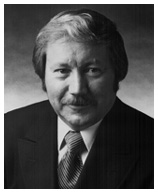Steelviper (talk | contribs) changed Donald Bellisario link |
m Text replacement - " -- " to "—" |
||
| (39 intermediate revisions by 20 users not shown) | |||
| Line 1: | Line 1: | ||
{{expansion}} | |||
{{Crew Data | |||
| image=Bsg_larson_glen.jpg | |||
| role=Executive Producer | |||
| series=TOS | |||
| born_month=1 | |||
| born_day=3 | |||
| born_year=1937 | |||
| death_month=11 | |||
| death_day=14 | |||
| death_year=2014 | |||
| nationality=US | |||
| imdb=0488991 | |||
}} | |||
'''Glen A. Larson''' (born 1937) is | '''Glen A. Larson''' (born 3 January 1937, died 14 November 2014) is the creator of the original ''[[Battlestar Galactica (TOS)|Battlestar Galactica]]'' and a "consulting producer" for the 2003 [[re-imagining|Re-imagined]] [[Battlestar Galactica (RDM)|Series]]. | ||
According to the Official Companion, Larson wanted a credit for the new 2003 [[Miniseries]] by [[Ronald D. Moore]] who began the Re-imagined Series, and his claim went to arbitration at the Writer's Guild of America. Ron Moore actually felt that Larson deserved a credit because the story was essentially the same as Larson's, just done "in different ways". As a result, Larson is credited in the Miniseries under the pseudonym "Christopher Eric James." Larson is also credited as a consulting producer on every episode of the Re-imagined Series because he holds the rights to the concept of ''Battlestar Galactica''. | |||
== Early Life == | |||
As child to a single mother, Glen A. Larson would be later described as a "latchkey kid" by his son, [[David Larson]], who notes his father's predilection for running water as being a means to remind himself of the halcyon time in his childhood. This was because Glen A. Larson's mother would start running a bath upon returning from work at night, and thus Larson would know that she had returned.<ref name="p35">{{cite book/sswa|35}}</ref> | |||
== The Four Preps == | |||
Later in life as a kid, he became a page at [[w:NBC|NBC]], where he became surrounded by motion picture and, later, television production.<ref name="p35"/> During this time, he also entered music under [[w:The Four Preps|The Four Preps]] in the late 1950s, writing and performing songs that hit the top 5 in the [[w:Billboard chart|''Billboard pop charts]], including "26 Miles (Santa Catalina)"<ref name="The Book of Golden Discs">{{cite book | |||
| first= Joseph | |||
| last= Murrells | |||
| year= 1978 | |||
| title= The Book of Golden Discs | |||
| edition= 2nd | |||
| publisher= Barrie and Jenkins Ltd | |||
| location= London | |||
| page= 91 | |||
| isbn= 0-214-20512-6 | |||
| url= https://archive.org/details/bookofgoldendisc00murr | |||
}}</ref> and "Big Man." In 1959, Larson appeared in the film ''[[w:Gidget (film)|Gidget]]'', making it his first on-screen appearance. | |||
== Career == | |||
During his work with the Four Preps, Glen A. Larson began writing using [[w:IBM Selectric|IBM Selectric]]s, writing his first script called "Finger Popper," a script that has never been produced.<ref name="p35"/> | |||
[[Category: A to Z]] | == Philosophy == | ||
When it came to writing, Larson believed that "writing isn't writing, it's rewriting" during the search for themes of a story. Whenever he would come across a story problem, he would "reverse it"—"if you can't make something happen one way you look at the opposite [ways]."<ref name="p34">{{cite book/sswa|34}}</ref> | |||
He was also known for isolating himself from distractions, secluding himself in his [[w:Malibu, California|Malibu, California]] residence when writing, not answering phone calls and delegating tasks to others.<ref name="p36">{{cite book/sswa|36}}</ref> [[Jeff Freilich]], [[Chris Bunch]], and [[Alan Cole]], among others, have noted this in various interviews relating to Larson's approach. | |||
== Notable Filmography == | |||
*''It Takes a Thief'' (1968) (TV series) (associate producer) | |||
*''The Six Million Dollar Man: Wine, Women and War'' (1973) (TV movie) (executive producer) | |||
*''The Six Million Dollar Man: Solid Gold Kidnapping'' (1973) (TV movie) (executive producer) | |||
*''Quincy, M.E.'' (1976) (TV series) (executive producer) | |||
*''[[Battlestar Galactica (TOS)|Battlestar Galactica]]'' (1978) | |||
*''Buck Rogers in the 25th Century'' Movie and TV series (1979) | |||
*''[[Galactica 1980]]'' (1980) | |||
*''Magnum, P.I.'' (1980) | |||
*''Knight Rider'' (1982) | |||
*''Team Knight Rider'' (1997) TV Series (executive producer) | |||
*''Millennium Man'' (1999) (TV) (executive producer) | |||
*''[[Battlestar Galactica (RDM)|Battlestar Galactica]]'' (2003) TV Miniseries (consulting producer) | |||
*''[[Battlestar Galactica (RDM)|Battlestar Galactica]]'' (2004) TV Series (consulting producer) | |||
*''[[Caprica (series)|Caprica]]'' (2009) TV Series (consulting producer) | |||
== Official Statements == | |||
* ''Glen A. Larson comments on the [[Battlestar Galactica (RDM)|Re-imagined Series]]:'' | |||
:Our point was to whenever possible make it a departure like you're visiting somewhere else and {{TOS|List of terms|we did coin certain phrases}} for use in expletive situations, but we tried to carry that over into a lot of other stuff, even push brooms and the coin of the realm.<ref>{{cite_web|url=http://www.cnn.com/2008/SHOWBIZ/TV/09/02/tv.what.the.frak.ap/|title=The curse word 'Battlestar Galactica' created|date=2 September 2008|accessdate=9 October 2008|last=|first=|format=|language=English}}</ref> | |||
== External links == | |||
{{ext-wikipedia|article=Glen A. Larson}} | |||
== References == | |||
{{reflist}} | |||
[[Category:A to Z]] | |||
[[Category:Crew]] | |||
[[Category:Crew (TOS)]] | [[Category:Crew (TOS)]] | ||
[[Category:Producers]] | |||
[[Category:TOS]] | |||
[[de:Glen Larson]] | |||
[[fr:Glen A. Larson]] | |||
Latest revision as of 16:26, 17 February 2024
| |||||
| ||||
|---|---|---|---|---|

| ||||
| Role: | Executive Producer | |||
| BSG Universe: | Original Series | |||
| Date of Birth: | January 3, 1937 | |||
| Date of Death: | November 14, 2014 | |||
| Age at Death: | 77 | |||
| Nationality: | ||||
[{{{site}}} Official Site]
| ||||
| IMDb profile | ||||
Glen A. Larson (born 3 January 1937, died 14 November 2014) is the creator of the original Battlestar Galactica and a "consulting producer" for the 2003 Re-imagined Series.
According to the Official Companion, Larson wanted a credit for the new 2003 Miniseries by Ronald D. Moore who began the Re-imagined Series, and his claim went to arbitration at the Writer's Guild of America. Ron Moore actually felt that Larson deserved a credit because the story was essentially the same as Larson's, just done "in different ways". As a result, Larson is credited in the Miniseries under the pseudonym "Christopher Eric James." Larson is also credited as a consulting producer on every episode of the Re-imagined Series because he holds the rights to the concept of Battlestar Galactica.
Early Life[edit]
As child to a single mother, Glen A. Larson would be later described as a "latchkey kid" by his son, David Larson, who notes his father's predilection for running water as being a means to remind himself of the halcyon time in his childhood. This was because Glen A. Larson's mother would start running a bath upon returning from work at night, and thus Larson would know that she had returned.[1]
The Four Preps[edit]
Later in life as a kid, he became a page at NBC, where he became surrounded by motion picture and, later, television production.[1] During this time, he also entered music under The Four Preps in the late 1950s, writing and performing songs that hit the top 5 in the Billboard pop charts, including "26 Miles (Santa Catalina)"[2] and "Big Man." In 1959, Larson appeared in the film Gidget, making it his first on-screen appearance.
Career[edit]
During his work with the Four Preps, Glen A. Larson began writing using IBM Selectrics, writing his first script called "Finger Popper," a script that has never been produced.[1]
Philosophy[edit]
When it came to writing, Larson believed that "writing isn't writing, it's rewriting" during the search for themes of a story. Whenever he would come across a story problem, he would "reverse it"—"if you can't make something happen one way you look at the opposite [ways]."[3]
He was also known for isolating himself from distractions, secluding himself in his Malibu, California residence when writing, not answering phone calls and delegating tasks to others.[4] Jeff Freilich, Chris Bunch, and Alan Cole, among others, have noted this in various interviews relating to Larson's approach.
Notable Filmography[edit]
- It Takes a Thief (1968) (TV series) (associate producer)
- The Six Million Dollar Man: Wine, Women and War (1973) (TV movie) (executive producer)
- The Six Million Dollar Man: Solid Gold Kidnapping (1973) (TV movie) (executive producer)
- Quincy, M.E. (1976) (TV series) (executive producer)
- Battlestar Galactica (1978)
- Buck Rogers in the 25th Century Movie and TV series (1979)
- Galactica 1980 (1980)
- Magnum, P.I. (1980)
- Knight Rider (1982)
- Team Knight Rider (1997) TV Series (executive producer)
- Millennium Man (1999) (TV) (executive producer)
- Battlestar Galactica (2003) TV Miniseries (consulting producer)
- Battlestar Galactica (2004) TV Series (consulting producer)
- Caprica (2009) TV Series (consulting producer)
Official Statements[edit]
- Glen A. Larson comments on the Re-imagined Series:
- Our point was to whenever possible make it a departure like you're visiting somewhere else and we did coin certain phrases for use in expletive situations, but we tried to carry that over into a lot of other stuff, even push brooms and the coin of the realm.[5]
External links[edit]
- Glen A. Larson article at Wikipedia, the free encyclopedia.
References[edit]
- ↑ 1.0 1.1 1.2 Altman, Mark A.; Gross, Edward (2018). So Say We All: The Complete, Uncensored, Unauthorized Oral History of Battlestar Galactica. Tor Books. ISBN 9781250128942, p. 35.
- ↑ Murrells, Joseph (1978). The Book of Golden Discs, 2nd, London: Barrie and Jenkins Ltd.
- ↑ Altman, Mark A.; Gross, Edward (2018). So Say We All: The Complete, Uncensored, Unauthorized Oral History of Battlestar Galactica. Tor Books. ISBN 9781250128942, p. 34.
- ↑ Altman, Mark A.; Gross, Edward (2018). So Say We All: The Complete, Uncensored, Unauthorized Oral History of Battlestar Galactica. Tor Books. ISBN 9781250128942, p. 36.
- ↑ The curse word 'Battlestar Galactica' created (backup available on Archive.org) . (2 September 2008). Retrieved on 9 October 2008.

